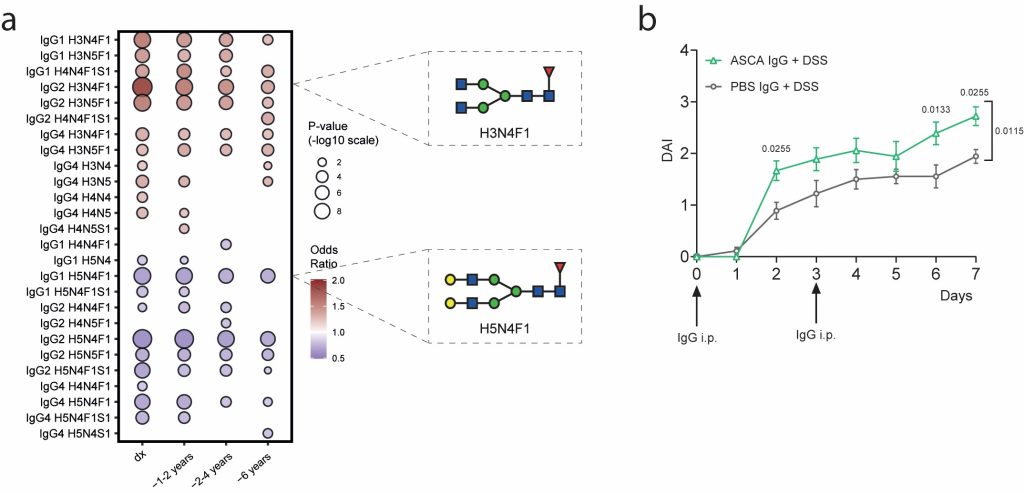Instituto de Investigação e Inovação em Saúde, Universidade do Porto
Rua Alfredo Allen, 208 4200-135 Porto, Portugal
Phone: +351 226 074 900
Email: info@i3s.up.pt
Exciting news! In our most recent publication, we unveil a novel glycan signature in serum IgG antibodies years before the diagnosis of Crohn’s disease. In addition to predating Crohn’s disease and being associated with its complications, we show how this glycan signature elicits pro-inflammatory immune responses and contributes to disease susceptibility.

Co-authored by Joana Gaifem, a postdoctoral researcher, and Cláudia Rodrigues, a PhD student, both from Pinho’s Lab, the study profiled longitudinal serum samples from the PREDICTS cohort (provided by the U. S. Department of Defense). This cohort included samples from individuals with Crohn’s disease obtained at four time points: approximately six, four, and two years before diagnosis (pre-clinical phase), and at diagnosis. The researchers identified reduced levels of IgG galactosylation up to six years before diagnosis, with this alteration being particularly prominent in anti-Saccharomyces cerevisiae antibodies (ASCA), which are commonly found in patients with Crohn’s disease. This serum IgG glycome-ASCA hub was also found to activate dendritic and NK cells, effectively promoting pro-inflammatory responses that culminate in more pronounced disease phenotypes. These findings were explored both in vitro and in vivo, revealing their pathogenic role in the initiation of intestinal inflammation.

Besides the members from Pinho’s lab, this work was developed in collaboration with national and international research teams, in particular Jean-Frederic Colombel (Icahn School of Medicine at Mount Sinai, New York, NY, USA), Joana Torres (Hospital Beatriz Ângelo and Hospital da Luz, Lisbon, Portugal), Gordan Lauc (Genos, Croatia) and Chad K. Porter (Naval Medical Research Command, Silver Spring, MD, USA).
Our findings, now published in Nature Immunology, shed light on a key pre-clinical stage of Crohn’s disease: we highlight not only a novel biomarker that can be detected long before clinical manifestation but also dissect how these IgG glycoforms can kickstart the transition from health to disease. This discovery offers new possibilities for monitoring and preventing inflammatory bowel disease as well as other immune-mediated disorders.